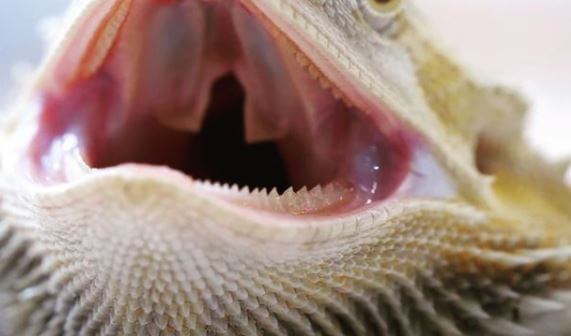More and more people choose bearded dragons as their household pets. Besides paying attention to their diet, bearded dragon teeth care is very important to keep them healthy.
As pet owners affectionately call it, caring for beardies is not difficult but many indeed do not know how to look after their teeth properly.
This article will provide you with the necessary information about bearded dragon teeth care. Read on to learn more about how you can take care of your bearded dragon’s teeth!
Related Posts:
- How High Can Beardies Jump and How to Keep Them Safe?
- Why Is a Beardie Trying to Escape His Cage?
- Why Does My Beardie Run Away From Me?
- Can You Use a Fish Aquarium for a Beardie?
- Is My Bearded Dragon Dehydrated? Reasons, Symptoms, and Treatments
- Can a Bearded Dragon Survive Outside? Detailed Guidelines and Useful Tips
How Do Bearded Dragons Chew Food?
Before we talk about bearded dragon teeth care, how do they chew food?
Like other animals, bearded dragons have teeth primarily used for feeding.
Their teeth are a very important element that cannot be ignored to keep them healthy.
If not, it will lead to sickness and other health issues.
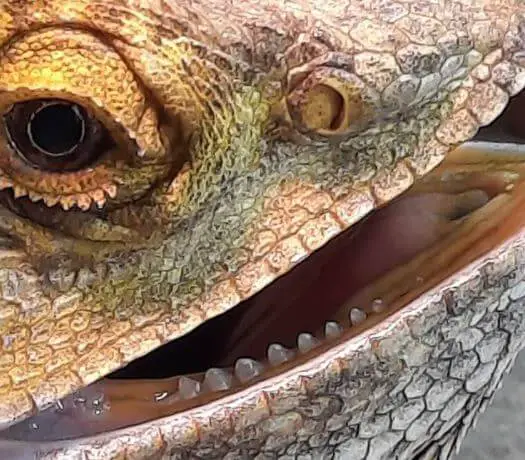
Beardies have an acrodont dentition.
Starting in the midline, a pleurodont tooth may push out an anterior acrodont tooth as it erupts.
It is superficially attached to the biting edges of the upper and lower jawbones.
Beardies use the front to catch and hold insects and the back to chew food.
Moreover, they also bite when they fight with each other or to protect their zone.
The acrodont teeth are easily lost and cannot be replaced with new ones.
The picture below will help you imagine more easily.
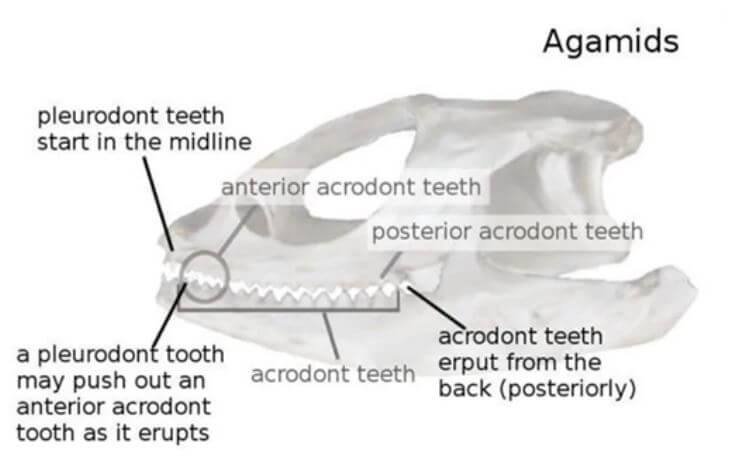
What Do Bearded Dragons Eat?
They are well-known for being gentle and docile pet reptiles.
Similar to other omnivores, this reptile has a basic diet that includes both plants and animals.
Hence, it is important to have them well cared for for health guarantee. Their diet is a combination of vegetables and insects.
You should ensure the vegetables’ freshness and nutrition found in some food as follows:
- Artichoke
- Carrot
- Cabbage
- Celery
- Cucumber
Fruits, such as apples, cherries, grapes, and peaches are also good choices.
Insects are indispensable to their meals, which helps them achieve optimal growth. It would be best if you can feed them with live insects.
Nevertheless, do not worry if you can not find living ones. Dried food is still okay.
You just need to be careful when choosing bugs since they can carry dangerous parasites.
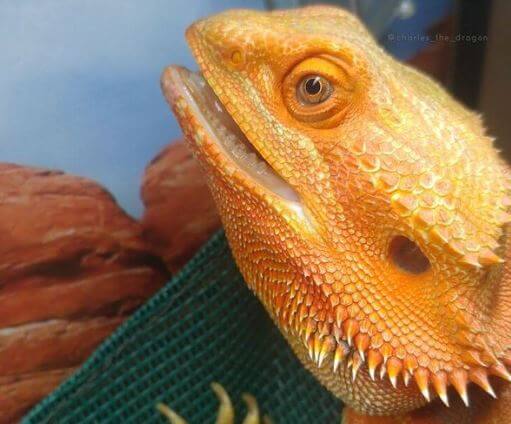
Apart from it, leaves and vegetables are also important as the main source of water.
The bigger your pet is, the bigger insects he/she can eat and more leafy vegetables.
Veterinarians also say that calcium supplements help your pet’s skeleton develop better, avoiding bone metabolisms such as the curvaceous dorsal spine, zigzag tailbone, and short lifespan.
Why Is Bearded Dragon Teeth Care Important?
Anything can lead to huge problems if you do not pay attention to bearded dragon teeth care properly.
The most popular periodontal disease they can take is tartar and gingivitis.
These might cause them inappetence, lethargy, and dehydration.
In the first stage, bearded dragon teeth gradually changing to brown in small areas is the easiest signal that can be seen.
You should start brushing bearded dragon teeth once or twice per week.
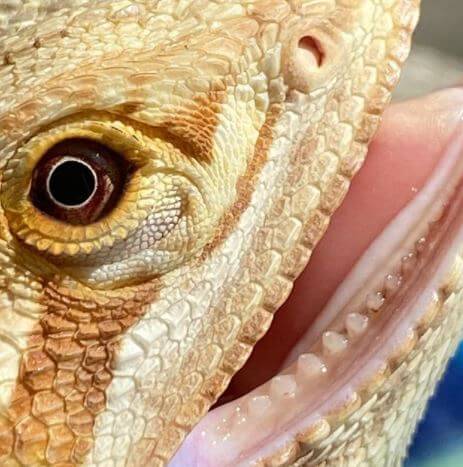
After that, the discoloration area will spread up to the whole dentition when tartar starts to build up.
It seems to develop easily if you feed bearded dragons too much soft food. You should brush bearded dragon teeth every one to two days if this is the case.
Coming to the third stage, tartar buildup gradually increases along with red gums.
This situation leads to teeth recession away from the gums and the bearded dragon has black teeth, causing lots of discomfort for our pet.
Besides the usual brush, we need to bring them to the vet for anesthetized dental cleaning.
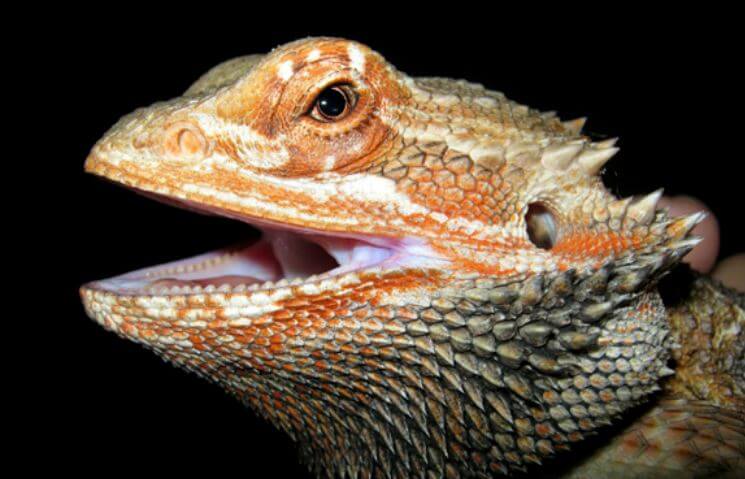
More seriously, the disease gets to the fourth stage when the tartar covers the dentition.
At this stage, their gingivitis is becoming weaker and infecting their jawbones.
They need to have not only anesthetized dental cleaning and brushing but also antibiotics.
In the last stage, severe osteomyelitis causes parts of the jaw bone to die and separate.
Owners must send them to the vet to have the bearded dragon teeth cleaned with specific care methods such as dental cleanings, bone debridement, or lifelong antibiotic treatment.
Sometimes, the owner must consider humane euthanasia for irremediable cases.
How Do You Clean a Bearded Dragon’s Mouth?
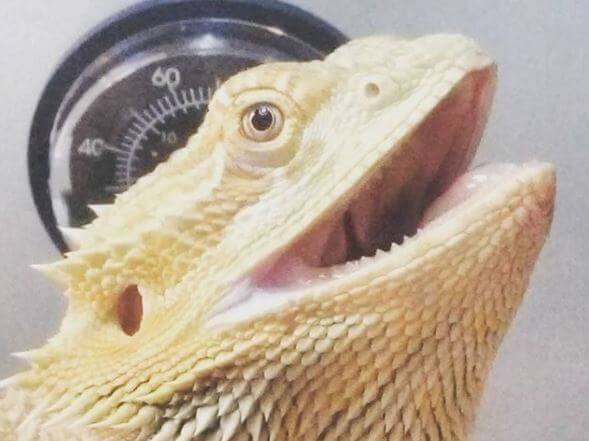
It is a matter of fact that the lack of cleaning your beardies’ mouth in the right way is predisposed to periodontal disease.
To avoid these things, you should have routine care for them.
The best way to clean is using a Q-tip soaked in dilute chlorhexidine solution then politely do bearded dragon teeth care.
Chlorhexidine provides a residual effect for up to 2 days. You can ask your pet’s veterinarian if it is suitable for them.
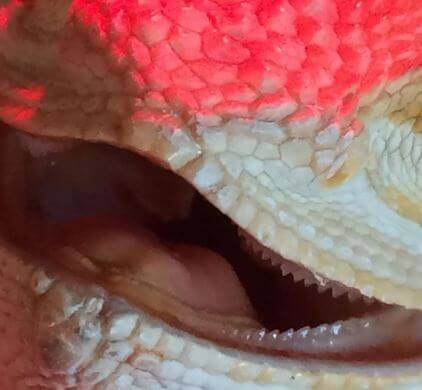
It would be best for your pet to have routine teeth care done once to twice a week.
Only use a Q-tip or cotton ball as a bearded dragon toothbrush.
Gently rind the lip down to see small triangles in his mouth, and then swab Q-tip with dilute solution along with them and the gums on both sides, up and down.
Watch this video to see how to care for bearded dragon teeth:
How to Keep the Bearded Dragon Teeth Healthy?
How often you clean your bearded dragon teeth determines how healthy they are.
There are 3 main affecting factors: diet, lighting, and fighting each other.
Firstly, veterinarians suggest that you should limit the amount of citrus and sugary fruits in beardies’ diet because the high level of sugar in those fruits will be more harmful than good.
You had better feed them crunchy insects and crunchy vegetables instead.
Chewing these types of food will naturally clean bearded dragon teeth.
An advisable balanced diet for baby ones is a combination of 60% protein from insects and 40% vegetation (limited fruits).
For an adult one, you should adjust their diet to around 80% insect proteins and 20% vegetation (limited fruits).
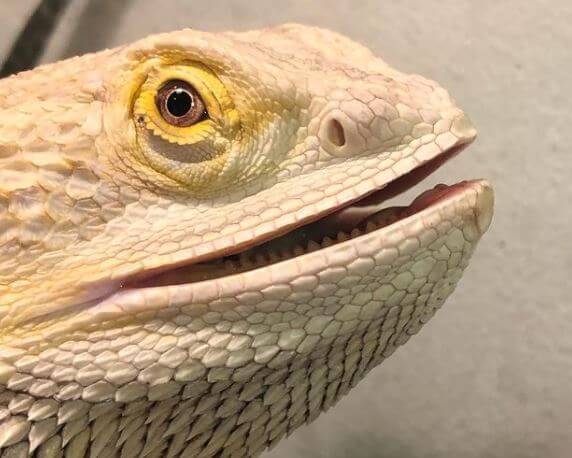
Apart from a balanced diet, you should use the proper light within the enclosure to keep these little triangles healthy.
Make sure that you set up UVB lighting appropriately so that they can properly and effectively absorb calcium.
A wrong, broken, or faulty setup can lead to wide-scale effects on your pet’s health in general.
It is essential to set up a basking lamp with the right temperature for them to rest and digest properly, specifically extracting and absorbing all the necessary nutrients from their diet.
The last one, fighting each other, rarely happens, and only when you want to own more than one reptile.
In that case, you should keep them in separate places to avoid this.
Frequently Asked Questions About Bearded Dragon Teeth Care
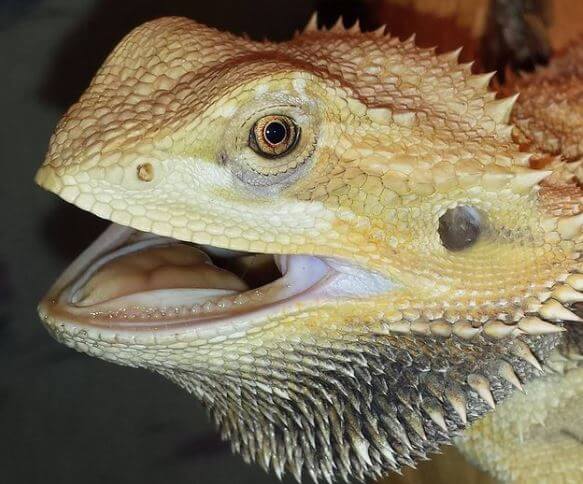
1. Do Baby Bearded Dragons Have Teeth?
Yes, all bearded dragons have had teeth since they were babies.
Different from humans, baby bearded dragons have quite sharp teeth to chew food and theirs will be blunter when they grow up.
2. Why Are My Bearded Dragon’s Teeth Black?
It is telling you that your pet is having health issues, so you need to bring him to your veterinarian.
His teeth might have been exposed to infection due to poor diet or lack of brush.
3. Is a Bearded Dragon’s Bite Dangerous to Humans?
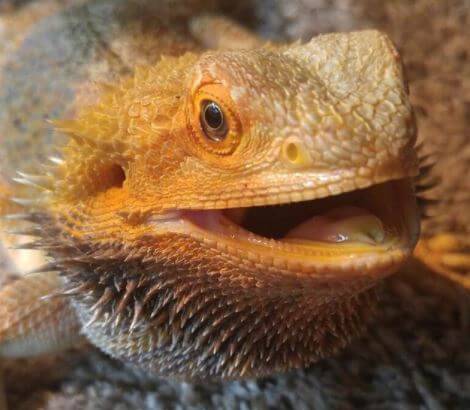
Not at all. Studies show that their bite has poison but it is harmless to humans and other animals.
If he bites you, keep calm and mildly use your free hand to open his mouth and take your finger out.
4. Do Bearded Dragons Like to Be Brushed?
They do not feel comfortable when being brushed.
As you see in the video above, the bearded dragon seems not ready for his teeth to be cleaned, despite not being the first time.
In that case, you need to gradually comfort and gently do bearded dragon teeth care.

5. Do Bearded Dragons’ Teeth Grow Back?
They may not lose, but will naturally wear down day by day.
Nevertheless, if you do not take care of them properly, your pet can lose his acrodont teeth, which never grow back.
6. How Do I Know If My Bearded Dragon’s Mouth Is Rotting?
A loss of appetite, visible dead tissue in the mouth, or red inflamed mouth tissue, etc. are signals of mouth rot.
You should regularly stay focused on your pet’s diet.
If he has these symptoms, contact your veterinarian immediately to avoid more severe problems for him.
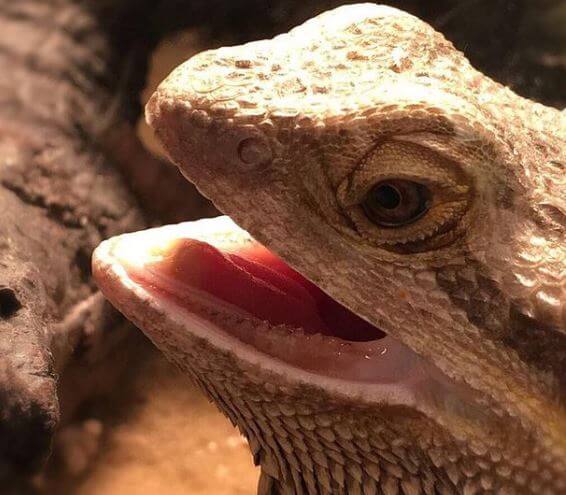
7. Is It OK If I Can’t Feed My Bearded Dragon With Fresh Food?
This is the most popular pet owners’ concern.
Normally, they are too busy at work that they cannot spend time preparing nutritious meals for their pets.
However, no need to worry about it!
You can buy formulated commercial products, which include both vegetables and insects packed in one for your pet at the pet shop.
Conclusion
Taking care of a pet is never easy as you cannot understand their language and what they want.
Besides concentrating on their regimen to keep them healthy, you need to learn about bearded dragon teeth care to give them a favorable developing environment.
It is very essential that you need not only satisfy their demand for nutritious combinations of insects and vegetables but also help them avoid stress and depression.
We hope this article helps you get more worthwhile information regarding bearded dragon teeth care and have suitable routine care for your beloved pet.
Key points for bearded dragon teeth care:
Dental health is an essential aspect of caring for your bearded dragon. While their teeth are not visible like those of mammals, they play a vital role in their overall well-being. Here are key points to consider when it comes to bearded dragon teeth care:
1. Tooth Structure:
- Bearded dragons have a row of small, conical teeth along their upper and lower jaws.
- These teeth are used for gripping, tearing, and breaking down food.
2. Self-Sharpening Teeth:
- Bearded dragon teeth are self-sharpening, meaning they continuously grow and wear down through normal chewing behavior.
- Chewing on insects and roughage helps maintain their dental health.
3. Proper Diet:
- Providing a balanced and diverse diet is crucial for bearded dragons’ dental health.
- A diet of insects, leafy greens, and vegetables offers the variety needed to stimulate their chewing.
4. Avoid Feeding Hard Foods:
- Hard foods like nuts or seeds should be avoided as they can lead to dental wear and potential tooth damage.
5. Calcium and Phosphorus Balance:
- Maintaining the correct calcium-to-phosphorus ratio in their diet is vital for overall health, including dental health.
- Imbalances can lead to dental and skeletal problems.
6. Water Source:
- Bearded dragons obtain hydration from their food and do not require a separate water bowl.
- Proper hydration supports their oral health by preventing dry mouth and tooth decay.
7. Dental Issues and Symptoms:
- Dental problems in bearded dragons can manifest as difficulty eating, weight loss, or unusual behaviors during mealtime.
- Look for these signs and seek veterinary care if you suspect dental issues.
8. Professional Dental Care:
- Routine dental care by a veterinarian experienced with reptiles may be necessary if your bearded dragon develops dental problems.
- This can include filing or trimming overgrown teeth to ensure proper alignment.
9. Oral Hygiene:
- While bearded dragons don’t require brushing like humans, maintaining their oral hygiene involves providing clean food and a clean environment.
- Avoid offering contaminated or dirty food items.
10. Chewing Enrichment: – Encourage natural chewing behaviors through enrichment items. – Providing safe, edible items like dried herbs or plant material can promote dental health.
11. Supervised Exploration: – Allow your bearded dragon supervised exploration outside of their enclosure. – This promotes natural behaviors, including chewing on plants or safe objects.
12. Preventing Dental Overgrowth: – A well-balanced diet, proper calcium supplementation, and a suitable environment are essential for preventing dental overgrowth. – Overgrown teeth can lead to impaction or other health issues.
In summary, bearded dragon teeth care is an integral part of their overall well-being. A balanced diet, proper calcium-to-phosphorus ratio, and environmental enrichment are key components of dental health. Regular monitoring of their oral health, including looking for signs of dental problems, will help you address any issues promptly. When in doubt, consult a reptile veterinarian for professional guidance on maintaining your bearded dragon’s dental health.
Related Posts:
- Carolina Custom Cages Terrarium Review
- 8 Best Basking Rocks for Beardie: What Is the Best Choice?
- 10 Best Thermometers for Beardie: How to Choose the Best One?
- 5 Best Beardie Lighting Setups for Beardie Lovers
- 9 Best Heat Lamps for Beardie: Natural Habitat Provided

